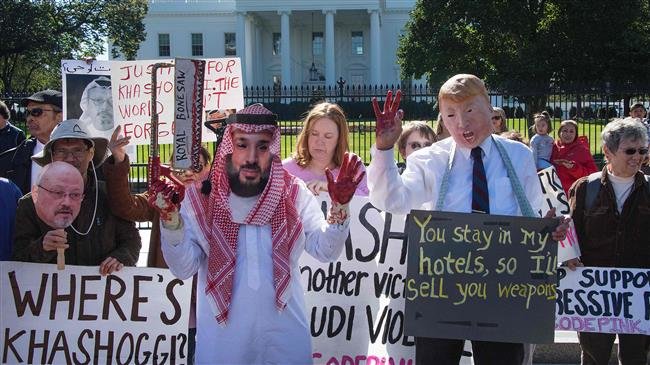
RNA - According to Turkish President Recep Tayyip Erdogan, the order to kill journalist Jamal Khashoggi came from the “highest levels” of the Saudi government, and the “puppet masters” should be unmasked.
In his words, “As responsible members of the international community, we must reveal the identities of the puppet masters behind Khashoggi’s killing and discover those in whom Saudi officials - still trying to cover up the murder - have placed their trust.”
Khashoggi, a Washington Post columnist critical of the Saudi government and its de facto ruler Crown Prince Mohammed bin Salman, disappeared after he entered the Saudi consulate in Istanbul on October 2. Now an adviser to Erdogan says MBS, as the crown prince is informally known, has “blood on his hands” over Khashoggi’s killing. This is the bluntest comments yet from someone linked to President Erdogan about Riyadh’s de facto ruler in connection with the appalling murder.
Of course, the Saudi regime continues to insist that the journalist died in an unplanned “rogue operation”, while Saudi public prosecutor Saud Al Mojeb says the attack was premeditated. However, as maintained by President Erdogan, the Saudi consul in Istanbul is lying “through his teeth” and the Saudi chief prosecutor is refusing to cooperate, stalling the process and not answering simple questions.
As is often the case, there is more to Khashoggi’s grisly murder than just “rogue operation” by a group of security officials. Many other Saudi journalists face similar threats, attacks and gruesome fate, often instigated by the regime itself. The international civil society has already demonstrated the toxic nature and outsized reach of Saudi incitement against journalists, but it is yet to demand that it stop through action, such as a resolution at the United Nations.
It is, therefore, the UN’s responsibility to ensure that crimes against journalists like Khashoggi do not go unpunished. This could only be the case if an international body – not the Saudi regime - conducts impartial, prompt and thorough investigations. Riyadh has not yet responded adequately to the crime against Khashoggi, which means impunity for crimes against other Saudi journalists with further violence and attacks.
This is important, because President Erdogan has highlighted the role that Saudi leaders themselves play in condoning and inciting violence, framing Saudi reporters as enemies of the people or extremists. This includes extrajudicial killings, incitement of hatred and violence against the media that report Saudi war crimes, and support for extremist militants in the ongoing wars on Syria and Yemen.
True, the grisly murder and dismemberment of Khashoggi somehow managed to grab the headlines, thanks to the courage of Turkish President Erdogan and intelligence agencies. But many more do not, particularly those citizen journalists and bloggers still in Saudi Arabia, Bahrain, and the United Arab Emirates prisons, where the scale of the issue of human rights violations often goes unremarked.
According to Fars News Agency, women journalists and bloggers have also been increasingly exposed to violence and imprisonment. But despite all of this, legal impunity for perpetrators of crimes against journalists remains the norm, as most cases are unresolved and unreported. This includes the targeted assassination of journalists that are investigating corruption and abuse of power, expressing political or social views which the autocratic regimes wish to silence, particularly in Bahrain. Some simply stand as a voice of peace in times of war.
Irrespective of the motive, the systematic targeting of journalists in the Persian Gulf Arab littoral states is still a telling reflection of how important and vital their work is. No doubt the killing, kidnapping, enforced disappearance, arbitrary detention and torture of these truth-seeking journalists and associated media personnel in places like Saudi Arabia, Bahrain and the UAE are a violation of Article 19 of the Universal Declaration of Human Rights, which, among other things, recognizes the freedom to “seek, receive and impart information and ideas of all kinds, regardless of frontiers”.
Those who play with fire in Saudi Arabia must remember that smoke gets in their eyes. It is time for the United Nations and international human rights groups to ensure accountability for crimes the Saudi regime and its partners commit against citizen journalists, particularly those who face pressures and threats of all sorts, including murder, for shedding light on the ongoing humanitarian crises in Syria and Yemen.
The world community should bring those who perpetrate crimes against journalists to justice, stop them from manipulating growing public opinion, reduce and end their violent conflicts in Syria and Yemen, and ultimately ensure the broader benefits to global peace and security.
847/940